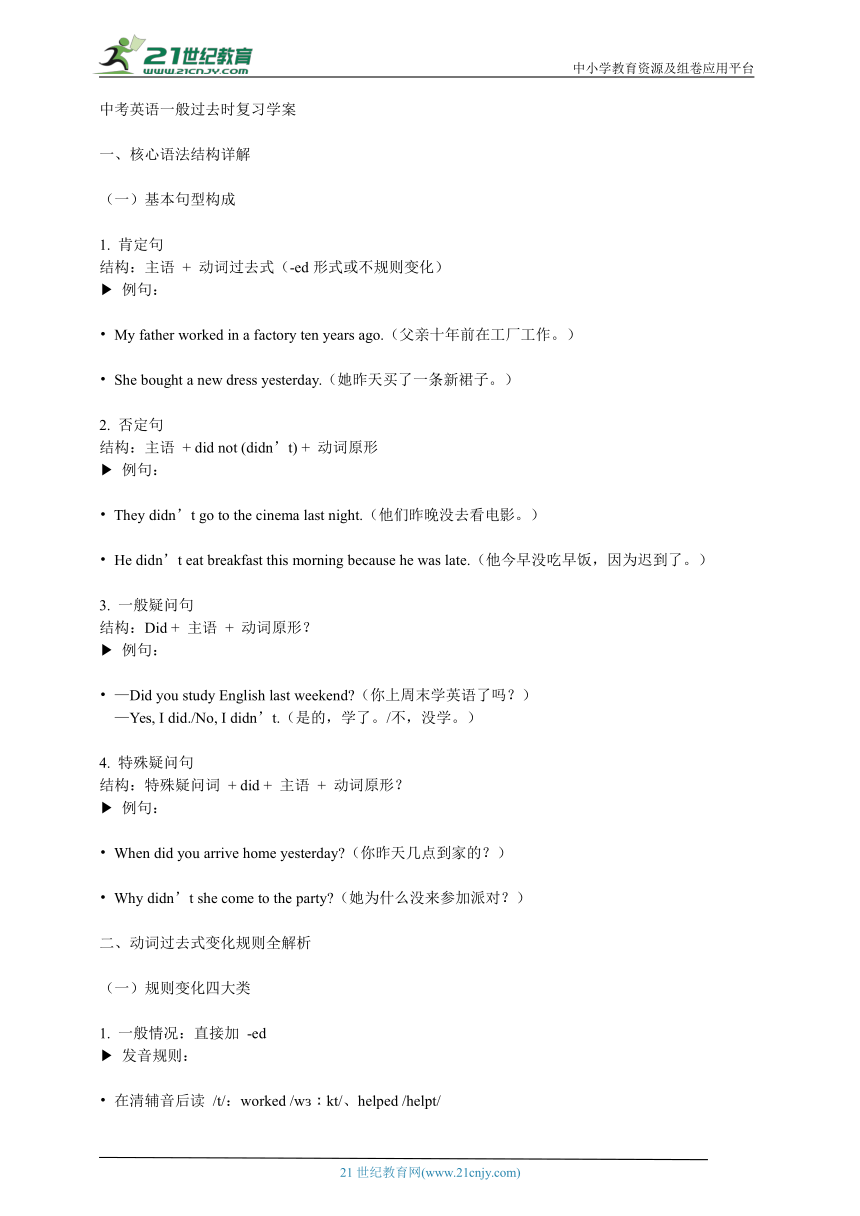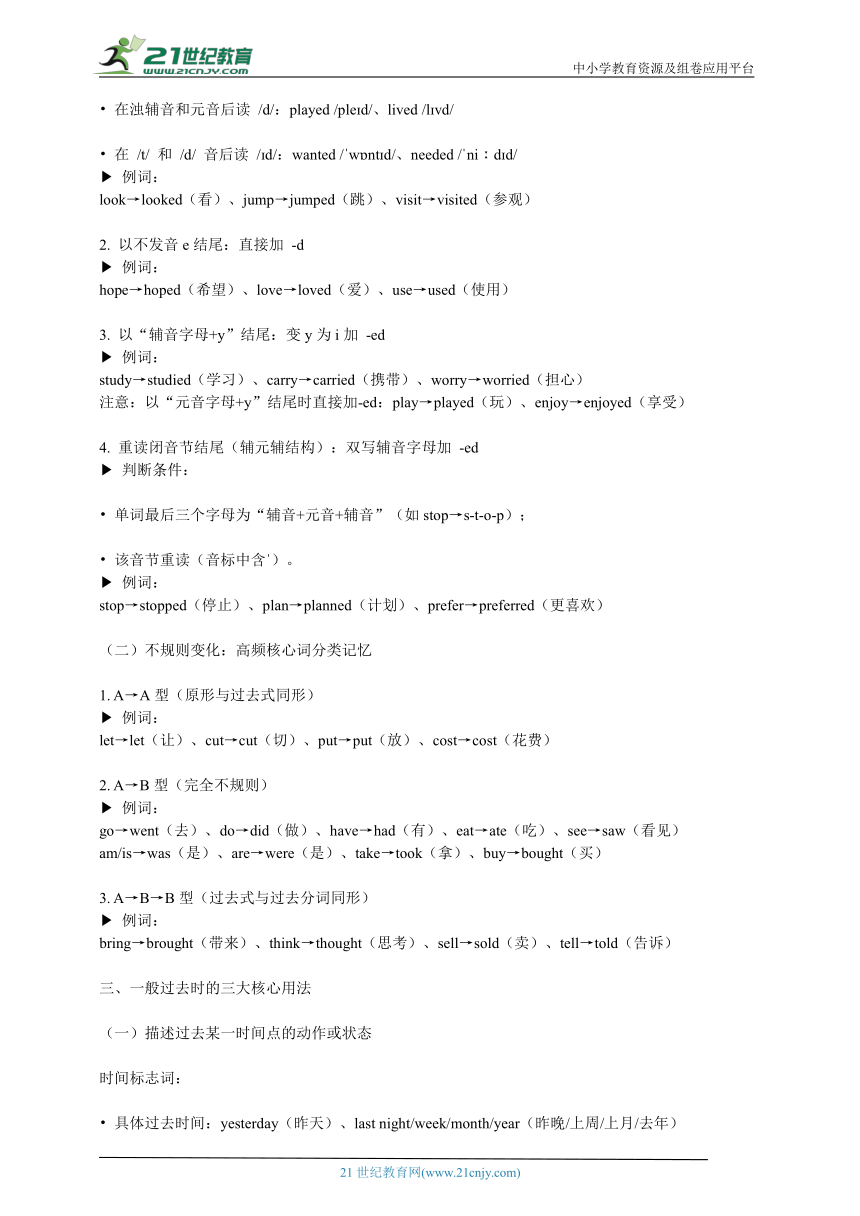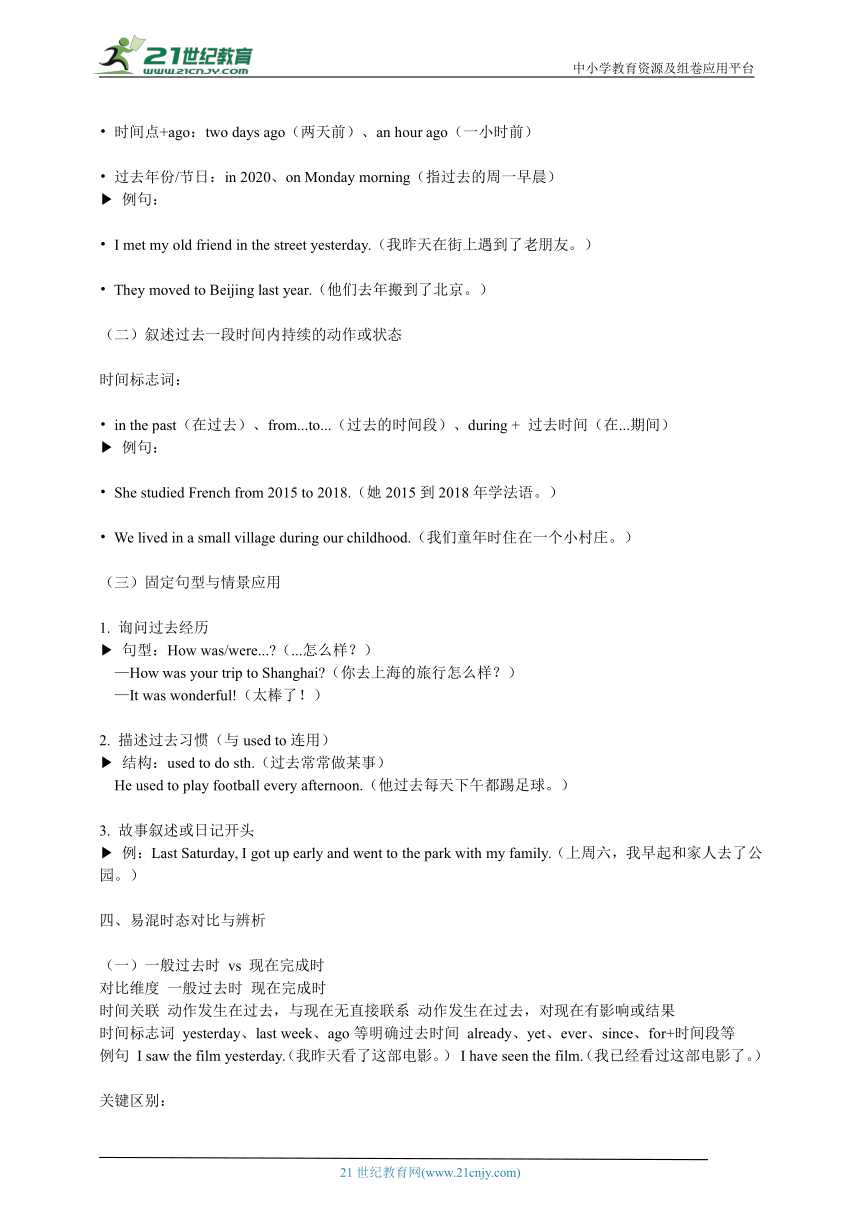中考英语语法复习学案(一般过去时)
图片预览



文档简介
中小学教育资源及组卷应用平台
中考英语一般过去时复习学案
一、核心语法结构详解
(一)基本句型构成
1. 肯定句
结构:主语 + 动词过去式(-ed形式或不规则变化)
例句:
My father worked in a factory ten years ago.(父亲十年前在工厂工作。)
She bought a new dress yesterday.(她昨天买了一条新裙子。)
2. 否定句
结构:主语 + did not (didn’t) + 动词原形
例句:
They didn’t go to the cinema last night.(他们昨晚没去看电影。)
He didn’t eat breakfast this morning because he was late.(他今早没吃早饭,因为迟到了。)
3. 一般疑问句
结构:Did + 主语 + 动词原形?
例句:
—Did you study English last weekend (你上周末学英语了吗?)
—Yes, I did./No, I didn’t.(是的,学了。/不,没学。)
4. 特殊疑问句
结构:特殊疑问词 + did + 主语 + 动词原形?
例句:
When did you arrive home yesterday (你昨天几点到家的?)
Why didn’t she come to the party (她为什么没来参加派对?)
二、动词过去式变化规则全解析
(一)规则变化四大类
1. 一般情况:直接加 -ed
发音规则:
在清辅音后读 /t/:worked /w kt/、helped /helpt/
在浊辅音和元音后读 /d/:played /ple d/、lived /l vd/
在 /t/ 和 /d/ 音后读 / d/:wanted / w nt d/、needed / ni d d/
例词:
look→looked(看)、jump→jumped(跳)、visit→visited(参观)
2. 以不发音e结尾:直接加 -d
例词:
hope→hoped(希望)、love→loved(爱)、use→used(使用)
3. 以“辅音字母+y”结尾:变y为i加 -ed
例词:
study→studied(学习)、carry→carried(携带)、worry→worried(担心)
注意:以“元音字母+y”结尾时直接加-ed:play→played(玩)、enjoy→enjoyed(享受)
4. 重读闭音节结尾(辅元辅结构):双写辅音字母加 -ed
判断条件:
单词最后三个字母为“辅音+元音+辅音”(如stop→s-t-o-p);
该音节重读(音标中含 )。
例词:
stop→stopped(停止)、plan→planned(计划)、prefer→preferred(更喜欢)
(二)不规则变化:高频核心词分类记忆
1. A→A型(原形与过去式同形)
例词:
let→let(让)、cut→cut(切)、put→put(放)、cost→cost(花费)
2. A→B型(完全不规则)
例词:
go→went(去)、do→did(做)、have→had(有)、eat→ate(吃)、see→saw(看见)
am/is→was(是)、are→were(是)、take→took(拿)、buy→bought(买)
3. A→B→B型(过去式与过去分词同形)
例词:
bring→brought(带来)、think→thought(思考)、sell→sold(卖)、tell→told(告诉)
三、一般过去时的三大核心用法
(一)描述过去某一时间点的动作或状态
时间标志词:
具体过去时间:yesterday(昨天)、last night/week/month/year(昨晚/上周/上月/去年)
时间点+ago:two days ago(两天前)、an hour ago(一小时前)
过去年份/节日:in 2020、on Monday morning(指过去的周一早晨)
例句:
I met my old friend in the street yesterday.(我昨天在街上遇到了老朋友。)
They moved to Beijing last year.(他们去年搬到了北京。)
(二)叙述过去一段时间内持续的动作或状态
时间标志词:
in the past(在过去)、from...to...(过去的时间段)、during + 过去时间(在...期间)
例句:
She studied French from 2015 to 2018.(她2015到2018年学法语。)
We lived in a small village during our childhood.(我们童年时住在一个小村庄。)
(三)固定句型与情景应用
1. 询问过去经历
句型:How was/were... (...怎么样?)
—How was your trip to Shanghai (你去上海的旅行怎么样?)
—It was wonderful!(太棒了!)
2. 描述过去习惯(与used to连用)
结构:used to do sth.(过去常常做某事)
He used to play football every afternoon.(他过去每天下午都踢足球。)
3. 故事叙述或日记开头
例:Last Saturday, I got up early and went to the park with my family.(上周六,我早起和家人去了公园。)
四、易混时态对比与辨析
(一)一般过去时 vs 现在完成时
对比维度 一般过去时 现在完成时
时间关联 动作发生在过去,与现在无直接联系 动作发生在过去,对现在有影响或结果
时间标志词 yesterday、last week、ago等明确过去时间 already、yet、ever、since、for+时间段等
例句 I saw the film yesterday.(我昨天看了这部电影。) I have seen the film.(我已经看过这部电影了。)
关键区别:
一般过去时侧重“过去发生的事实”(如“昨天做了某事”);
现在完成时侧重“过去动作对现在的影响”(如“已经知道结果”)。
(二)一般过去时 vs 过去进行时
对比维度 一般过去时(完成的动作) 过去进行时(过去某时正在进行的动作)
动作状态 动作已完成(强调结果) 动作未完成(强调过程)
时间标志词 单一过去时间(如yesterday) 过去某时刻(如at 8 pm yesterday)
例句 He finished his homework last night.(他昨晚完成了作业。) He was doing his homework at 8 pm last night.(他昨晚八点在写作业。)
五、常见错误类型及应对策略
(一)规则动词过去式拼写错误
错误类型:
误加“s”:× playeds → √ played
未双写辅音字母:× stoped → √ stopped
未变y为i:× studyed → √ studied
应对策略:
牢记四类规则变化的发音和拼写规则;
针对易混淆词(如prefer→preferred、travel→traveled)专项练习。
(二)不规则动词记忆错误
错误类型:
混淆相似动词:× goed → √ went、× buyed → √ bought
遗漏特殊变化:× eated → √ ate
应对策略:
分类记忆高频不规则动词(如“ABC型”“ABB型”);
制作单词卡片,通过例句强化记忆(如do→did→I did my best)。
(三)助动词did使用错误
错误类型:
否定句未用didn’t:× He not went to school. → √ He didn’t go to school.
疑问句未还原动词原形:× Did you went there → √ Did you go there
应对策略:
牢记“did是助动词,后接动词原形”的规则;
通过“肯定句→否定句→疑问句”句型转换练习强化。
(四)be动词与实义动词混用
错误类型:
错误叠加:× They were played football. → √ They played football.
应对策略:
明确一般过去时中,be动词(was/were)与实义动词不能同时使用;
区分“主系表结构”(如She was happy)和“主谓结构”(如She played happily)。
六、实战演练与中考真题精讲
(一)基础能力训练
1. 用所给动词的正确形式填空
① She ______ (visit) her grandparents last Sunday.
② They ______ (not go) to the concert because they were busy.
③ ______ you ______ (watch) the basketball game on TV yesterday
答案:① visited;② didn’t go;③ Did; watch
2. 句型转换
① He did his homework at home.(改为否定句)
He ______ ______ his homework at home.
② They went to the beach last summer.(对划线部分提问)
______ ______ they ______ last summer
答案:① didn’t do;② Where did; go
(二)语境理解与运用
1. 单项选择
—What did you do on Children’s Day
—I ______ games with my friends in the park.
A. play B. played C. will play
解析:Children’s Day为过去时间,用过去式played,选B。
He ______ a beautiful song at the party last night.
A. sings B. sang C. is singing
解析:last night为过去标志,sing的过去式为sang,选B。
(三)中考真题分类解析
1. 时间标志词类(2024·湖北武汉)
—Did you go to the museum yesterday
—No, I ______. I stayed at home and read books.
A. don’t B. didn’t C. does
解析:yesterday为过去时间,否定回答用didn’t,选B。
2. 不规则动词类(2023·山东济南)
Last year, my family ______ to a new city. It was a big change for us.
A. move B. moves C. moved
解析:last year为过去时间,move为规则动词,直接加-ed,选C。
3. 语境逻辑类(2024·四川成都)
—How was your weekend
—Great! I ______ a picnic with my classmates in the park.
A. have B. had C. will have
解析:weekend为过去时间,have的过去式为had,选B。
4. 固定句型类(2024·湖南长沙)
—Where ______ you born, Linda
—I ______ born in Changsha.
A. were; was B. was; were C. are; am
解析:出生为过去动作,you与were搭配,I与was搭配,选A。
5. 否定句结构类(2022·浙江杭州)
He ______ any photos during the trip because his camera was broken.
A. took B. didn’t take C. wasn’t take
解析:camera was broken为过去时,否定句用didn’t + 动词原形,选B。
七、记忆口诀与学习技巧
(一)口诀速记
一般过去时真简单,过去动作记心间。
规则动词加-ed,不规则变化特殊记。
否定疑问找did,动词原形要牢记。
Yesterday, last, ago是信号,过去时间别混淆!
(二)高效学习法
1. 时间轴法:用时间轴标注过去事件(如last week→played basketball;yesterday→went shopping),直观理解时态。
2. 故事串联法:将不规则动词融入故事中记忆,如:
Yesterday, I went(去)to the park and saw(看见)a bird. It ate(吃)some bread I had(有).
3. 错题循环法:每周重做一次错题,标注易错点(如双写规则、不规则动词),直至完全掌握。
八、课后拓展任务
(一)基础巩固
1. 默写20个高频不规则动词(如go, do, have, see, eat等)。
2. 用一般过去时描述你昨天的三件事(例:I got up at 7 am and had eggs for breakfast...)。
(二)能力提升
1. 阅读一篇过去时态的短文(如日记、故事),划出所有过去式动词并分类(规则/不规则)。
2. 写作练习:以“My Last Holiday”为题,用一般过去时写一篇80词左右的短文,包含时间、地点、事件及感受。
(三)真题冲刺
1. 限时完成10道中考时态题,总结错误类型(如时间标志词漏看、不规则动词错误)。
2. 分析近三年中考卷中一般过去时的考点分布(如单项选择、完形填空、写作),针对性强化训练。
通过“规则掌握→语境应用→真题实战”的系统化复习,一般过去时不再是难点!坚持练习,中考必胜!
21世纪教育网 www.21cnjy.com 精品试卷·第 2 页 (共 2 页)
HYPERLINK "http://21世纪教育网(www.21cnjy.com)
" 21世纪教育网(www.21cnjy.com)
中考英语一般过去时复习学案
一、核心语法结构详解
(一)基本句型构成
1. 肯定句
结构:主语 + 动词过去式(-ed形式或不规则变化)
例句:
My father worked in a factory ten years ago.(父亲十年前在工厂工作。)
She bought a new dress yesterday.(她昨天买了一条新裙子。)
2. 否定句
结构:主语 + did not (didn’t) + 动词原形
例句:
They didn’t go to the cinema last night.(他们昨晚没去看电影。)
He didn’t eat breakfast this morning because he was late.(他今早没吃早饭,因为迟到了。)
3. 一般疑问句
结构:Did + 主语 + 动词原形?
例句:
—Did you study English last weekend (你上周末学英语了吗?)
—Yes, I did./No, I didn’t.(是的,学了。/不,没学。)
4. 特殊疑问句
结构:特殊疑问词 + did + 主语 + 动词原形?
例句:
When did you arrive home yesterday (你昨天几点到家的?)
Why didn’t she come to the party (她为什么没来参加派对?)
二、动词过去式变化规则全解析
(一)规则变化四大类
1. 一般情况:直接加 -ed
发音规则:
在清辅音后读 /t/:worked /w kt/、helped /helpt/
在浊辅音和元音后读 /d/:played /ple d/、lived /l vd/
在 /t/ 和 /d/ 音后读 / d/:wanted / w nt d/、needed / ni d d/
例词:
look→looked(看)、jump→jumped(跳)、visit→visited(参观)
2. 以不发音e结尾:直接加 -d
例词:
hope→hoped(希望)、love→loved(爱)、use→used(使用)
3. 以“辅音字母+y”结尾:变y为i加 -ed
例词:
study→studied(学习)、carry→carried(携带)、worry→worried(担心)
注意:以“元音字母+y”结尾时直接加-ed:play→played(玩)、enjoy→enjoyed(享受)
4. 重读闭音节结尾(辅元辅结构):双写辅音字母加 -ed
判断条件:
单词最后三个字母为“辅音+元音+辅音”(如stop→s-t-o-p);
该音节重读(音标中含 )。
例词:
stop→stopped(停止)、plan→planned(计划)、prefer→preferred(更喜欢)
(二)不规则变化:高频核心词分类记忆
1. A→A型(原形与过去式同形)
例词:
let→let(让)、cut→cut(切)、put→put(放)、cost→cost(花费)
2. A→B型(完全不规则)
例词:
go→went(去)、do→did(做)、have→had(有)、eat→ate(吃)、see→saw(看见)
am/is→was(是)、are→were(是)、take→took(拿)、buy→bought(买)
3. A→B→B型(过去式与过去分词同形)
例词:
bring→brought(带来)、think→thought(思考)、sell→sold(卖)、tell→told(告诉)
三、一般过去时的三大核心用法
(一)描述过去某一时间点的动作或状态
时间标志词:
具体过去时间:yesterday(昨天)、last night/week/month/year(昨晚/上周/上月/去年)
时间点+ago:two days ago(两天前)、an hour ago(一小时前)
过去年份/节日:in 2020、on Monday morning(指过去的周一早晨)
例句:
I met my old friend in the street yesterday.(我昨天在街上遇到了老朋友。)
They moved to Beijing last year.(他们去年搬到了北京。)
(二)叙述过去一段时间内持续的动作或状态
时间标志词:
in the past(在过去)、from...to...(过去的时间段)、during + 过去时间(在...期间)
例句:
She studied French from 2015 to 2018.(她2015到2018年学法语。)
We lived in a small village during our childhood.(我们童年时住在一个小村庄。)
(三)固定句型与情景应用
1. 询问过去经历
句型:How was/were... (...怎么样?)
—How was your trip to Shanghai (你去上海的旅行怎么样?)
—It was wonderful!(太棒了!)
2. 描述过去习惯(与used to连用)
结构:used to do sth.(过去常常做某事)
He used to play football every afternoon.(他过去每天下午都踢足球。)
3. 故事叙述或日记开头
例:Last Saturday, I got up early and went to the park with my family.(上周六,我早起和家人去了公园。)
四、易混时态对比与辨析
(一)一般过去时 vs 现在完成时
对比维度 一般过去时 现在完成时
时间关联 动作发生在过去,与现在无直接联系 动作发生在过去,对现在有影响或结果
时间标志词 yesterday、last week、ago等明确过去时间 already、yet、ever、since、for+时间段等
例句 I saw the film yesterday.(我昨天看了这部电影。) I have seen the film.(我已经看过这部电影了。)
关键区别:
一般过去时侧重“过去发生的事实”(如“昨天做了某事”);
现在完成时侧重“过去动作对现在的影响”(如“已经知道结果”)。
(二)一般过去时 vs 过去进行时
对比维度 一般过去时(完成的动作) 过去进行时(过去某时正在进行的动作)
动作状态 动作已完成(强调结果) 动作未完成(强调过程)
时间标志词 单一过去时间(如yesterday) 过去某时刻(如at 8 pm yesterday)
例句 He finished his homework last night.(他昨晚完成了作业。) He was doing his homework at 8 pm last night.(他昨晚八点在写作业。)
五、常见错误类型及应对策略
(一)规则动词过去式拼写错误
错误类型:
误加“s”:× playeds → √ played
未双写辅音字母:× stoped → √ stopped
未变y为i:× studyed → √ studied
应对策略:
牢记四类规则变化的发音和拼写规则;
针对易混淆词(如prefer→preferred、travel→traveled)专项练习。
(二)不规则动词记忆错误
错误类型:
混淆相似动词:× goed → √ went、× buyed → √ bought
遗漏特殊变化:× eated → √ ate
应对策略:
分类记忆高频不规则动词(如“ABC型”“ABB型”);
制作单词卡片,通过例句强化记忆(如do→did→I did my best)。
(三)助动词did使用错误
错误类型:
否定句未用didn’t:× He not went to school. → √ He didn’t go to school.
疑问句未还原动词原形:× Did you went there → √ Did you go there
应对策略:
牢记“did是助动词,后接动词原形”的规则;
通过“肯定句→否定句→疑问句”句型转换练习强化。
(四)be动词与实义动词混用
错误类型:
错误叠加:× They were played football. → √ They played football.
应对策略:
明确一般过去时中,be动词(was/were)与实义动词不能同时使用;
区分“主系表结构”(如She was happy)和“主谓结构”(如She played happily)。
六、实战演练与中考真题精讲
(一)基础能力训练
1. 用所给动词的正确形式填空
① She ______ (visit) her grandparents last Sunday.
② They ______ (not go) to the concert because they were busy.
③ ______ you ______ (watch) the basketball game on TV yesterday
答案:① visited;② didn’t go;③ Did; watch
2. 句型转换
① He did his homework at home.(改为否定句)
He ______ ______ his homework at home.
② They went to the beach last summer.(对划线部分提问)
______ ______ they ______ last summer
答案:① didn’t do;② Where did; go
(二)语境理解与运用
1. 单项选择
—What did you do on Children’s Day
—I ______ games with my friends in the park.
A. play B. played C. will play
解析:Children’s Day为过去时间,用过去式played,选B。
He ______ a beautiful song at the party last night.
A. sings B. sang C. is singing
解析:last night为过去标志,sing的过去式为sang,选B。
(三)中考真题分类解析
1. 时间标志词类(2024·湖北武汉)
—Did you go to the museum yesterday
—No, I ______. I stayed at home and read books.
A. don’t B. didn’t C. does
解析:yesterday为过去时间,否定回答用didn’t,选B。
2. 不规则动词类(2023·山东济南)
Last year, my family ______ to a new city. It was a big change for us.
A. move B. moves C. moved
解析:last year为过去时间,move为规则动词,直接加-ed,选C。
3. 语境逻辑类(2024·四川成都)
—How was your weekend
—Great! I ______ a picnic with my classmates in the park.
A. have B. had C. will have
解析:weekend为过去时间,have的过去式为had,选B。
4. 固定句型类(2024·湖南长沙)
—Where ______ you born, Linda
—I ______ born in Changsha.
A. were; was B. was; were C. are; am
解析:出生为过去动作,you与were搭配,I与was搭配,选A。
5. 否定句结构类(2022·浙江杭州)
He ______ any photos during the trip because his camera was broken.
A. took B. didn’t take C. wasn’t take
解析:camera was broken为过去时,否定句用didn’t + 动词原形,选B。
七、记忆口诀与学习技巧
(一)口诀速记
一般过去时真简单,过去动作记心间。
规则动词加-ed,不规则变化特殊记。
否定疑问找did,动词原形要牢记。
Yesterday, last, ago是信号,过去时间别混淆!
(二)高效学习法
1. 时间轴法:用时间轴标注过去事件(如last week→played basketball;yesterday→went shopping),直观理解时态。
2. 故事串联法:将不规则动词融入故事中记忆,如:
Yesterday, I went(去)to the park and saw(看见)a bird. It ate(吃)some bread I had(有).
3. 错题循环法:每周重做一次错题,标注易错点(如双写规则、不规则动词),直至完全掌握。
八、课后拓展任务
(一)基础巩固
1. 默写20个高频不规则动词(如go, do, have, see, eat等)。
2. 用一般过去时描述你昨天的三件事(例:I got up at 7 am and had eggs for breakfast...)。
(二)能力提升
1. 阅读一篇过去时态的短文(如日记、故事),划出所有过去式动词并分类(规则/不规则)。
2. 写作练习:以“My Last Holiday”为题,用一般过去时写一篇80词左右的短文,包含时间、地点、事件及感受。
(三)真题冲刺
1. 限时完成10道中考时态题,总结错误类型(如时间标志词漏看、不规则动词错误)。
2. 分析近三年中考卷中一般过去时的考点分布(如单项选择、完形填空、写作),针对性强化训练。
通过“规则掌握→语境应用→真题实战”的系统化复习,一般过去时不再是难点!坚持练习,中考必胜!
21世纪教育网 www.21cnjy.com 精品试卷·第 2 页 (共 2 页)
HYPERLINK "http://21世纪教育网(www.21cnjy.com)
" 21世纪教育网(www.21cnjy.com)
同课章节目录
- 词法
- 名词
- 动词和动词短语
- 动词语态
- 动词时态
- 助动词和情态动词
- 非谓语动词
- 冠词
- 代词
- 数词和量词
- 形容词副词及其比较等级
- 介词和介词短语
- 连词和感叹词
- 构词法
- 相似、相近词比较
- 句法
- 陈述句
- 一般疑问句和否定疑问句
- 特殊疑问句及选择疑问句
- 反意疑问句
- 存在句(There be句型)
- 宾语从句
- 定语从句
- 状语从句
- 主谓一致问题
- 简单句
- 并列句
- 复合句
- 主谓一致
- 主、表语从句
- 名词性从句
- 直接引语和间接引语
- 虚拟语气
- 感叹句
- 强调句
- 倒装句
- 祈使句
- 句子的成分
- 句子的分类
- 题型专区
- 单项选择部分
- 易错题
- 完形填空
- 阅读理解
- 词汇练习
- 听说训练
- 句型转换
- 补全对话
- 短文改错
- 翻译
- 书面表达
- 任务型阅读
- 语法填空
- 其他资料
